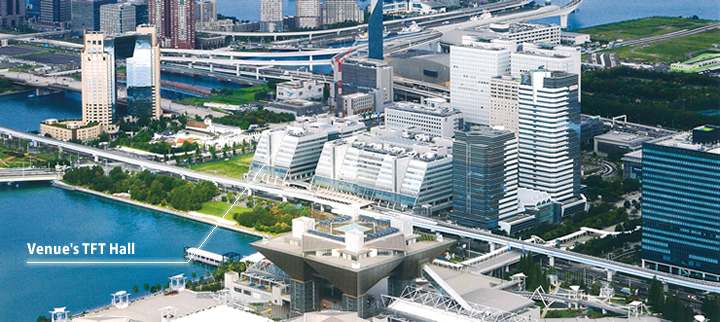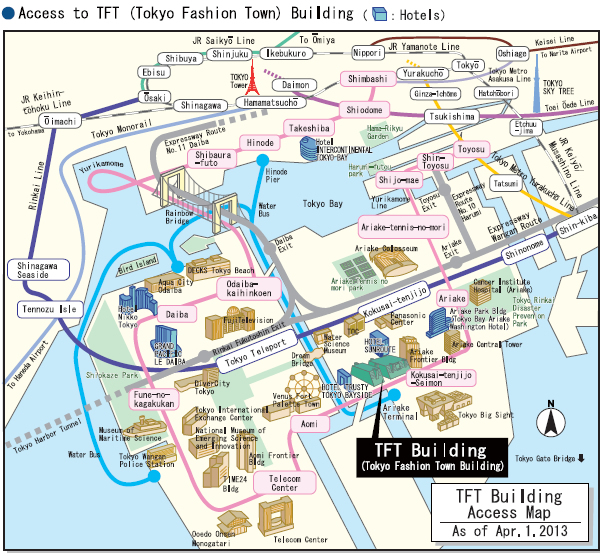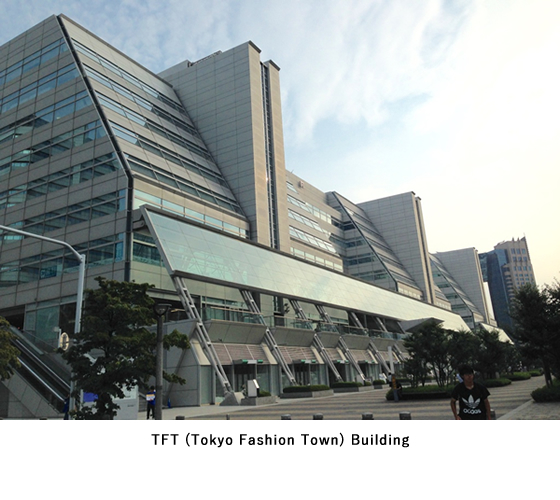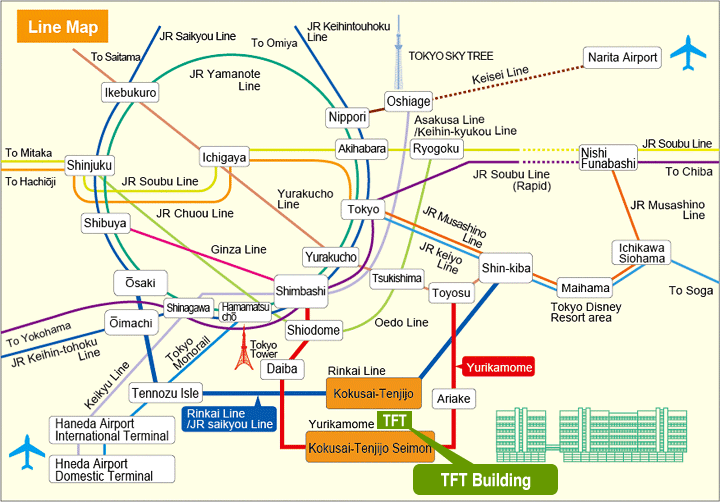| |
Access to TFT HALL |
| |
|
 |
| |
|
Big Sight Tokyo Fashion Town (TFT) Hall is conveniently located adjacent to Tokyo Big Sight in the capital city’s waterfront district, and is a versatile venue suitable for an extensive range of events. The West Wing provides three main halls of varying sizes on one level.
TFT Hall 1000 holds large-scale exhibitions with its generous floor space of 900 sq. meters.
Ideal for international conferences, film screenings and concerts.
TFT Hall 500 offers 440 sq. meters that come with rollback chairs and a simultaneous interpretation system.
The East Wing is set aside for meeting rooms, with retractable partitions allowing for flexible configurations.
High-speed Internet connectivity is available in all three halls and 14 meeting rooms.
East Wing 3-6-11 Ariake, Koto-ku, Tokyo
135-8071.
West Wing 3-4-10 Ariake, Koto-ku, Tokyo
135-8071
Tel: +81-3-5530-5010
Fax: +81-3-5530-1222
http://www.tokyo-bigsight.co.jp/english/tft/ |
| |
|
|
| |
|
 |
| |
|
 |
| |
|
Location
Just in front of Kokusai-tenjijo Station on Rinkai Line. Close to Odaiba area.
From Narita International Airport
About 70 minutes by Airport Limousine Bus bound for "Odaiba and Ariake areas"
Fare: JPY2,700 one-way for adult (JPY1,350 for child)
* A seat reservation is required for buses to be departed from the hotel. |
| |
|
From Haneda Airport
About 40 minutes by Airport Limousine Bus bound for "Takeshiba, Odaiba and Ariake areas"
Fare: JPY600 one-way for adult (JPY300 for child)
* A seat reservation is required for buses to be departed from the hotel.
About 33 minutes by Monorail from Haneda Airport Terminal 1 Station to Tennozu Isle Station and transfer to Rinkai Line.
Get off at Kokusai Tenjijo Station of Rinkai Line. Fare: JPY660 one-way for adult
About 35 minutes by Monorail from Haneda Airport Terminal 2 Station to Tennozu Isle Station and transfer to Rinkai Line.
Get off at Kokusai Tenjijo Station of Rinkai Line. Fare: JPY730 one-way for adult
From JR Tokyo Station
About 20 minutes on JR Keiyo Line to Shinkiba Station and transfer to Rinkai Line |
| |
|
From JR Shinagawa Station
About 20 minutes on JR Yamanote Line to Osaki Station and transfer to Rinkai Line |
| |
|
 |
| |
| |
About Japan |
| |
|
Click here (http://www.jnto.go.jp/eng/) |
| |
| |
Travel Tips |
| |
|
Money
The official currency of Japan is the yen (JPY), which can be easily obtained at the currency desks of major airports around the world. Yen can be conveniently obtained upon your arrive at Kansai International Airport, Osaka International Airport, and other international airports in Japan. Or if you prefer, you can change your money at one of the many currency exchange shops in Osaka or Kyoto, at a bank, or in major hotels. But for peace of mind, we recommend that you purchase your travelers' checks or cash in Yen or U.S. dollars before leaving your home country. Don't forget, you may be required to show your passport when using traveler's checks or exchanging money.
In terms of the actual bank notes, the highest denomination in yen is the 10,000-yen note. Despite having a relatively high value, you will notice 10,000 yen notes being used a lot. This is because Japan is still a cash-based society that is also quite safe. After the 10,000-yen note, there is also a 5,000-yen note, a 2,000-yen note, and a 1,000-yen note, although you seldom see the 2,000-yen notes.
As for coins, there are four silver-colored coins: the 500-yen coin, the 100-yen coin, the 50-yen coin with a hole through its center, and the 1-yen coin. The 10-yen coin and the 5-yen with a hole through its center are both bronze.
|
| |
| |
|
Credit cards
Most hotels, major department stores and restaurants accept VISA, Master, JCB, Amex and Diners Club cards. However, smaller shops like train station kiosks, convenience stores, vending machines and train ticket machines do not tend to accept credit cards, so it is always wise to make sure you are carrying some cash. |
| |
| |
|
Traveler's checks
Traveler's checks are accepted at most hotels and banks. |
| |
| |
|
ATMs
Cards from Cirrus, PLUS, Maestro and VISA Electron networks can all be used at post office ATMs. Usually you can find a post office located close to a train station. |
| |
| |
|
Business hours |
| |
|
・ |
Banks are open from 9:00 am to 3:00 pm and are closed on Saturdays and Sundays. |
| |
|
・ |
Currency exchange desks at airports are open from 6:00 am to 10:00 pm 365 days a year. |
| |
|
・ |
Supermarkets are generally open from 9:00 am to 8:00 pm, although this can vary from store to store. |
| |
|
・ |
Convenience stores are generally open 24 hours a day. |
| |
|
・ |
Post offices are open for 9:00 am to 5:00 pm and are closed on Saturdays and Sundays. |
| |
|
・ |
Department stores are open 7 days a week from 10:00 am to 8:00 pm. |
| |
|
・ |
Some restaurants are open 24 hours a day. Others are open from 9:00 am to 11:00 pm. |
| |
|
・ |
Bars are generally open from 6:00 pm to midnight. |
| |
|
| |
|
Electricity
Appliances in Japan run on 100V A.C. and plug in to a 2-flat pin, Type A socket. It is difficult to find sockets compatible with 3-pin plugs or supplying 120V, 200V, and 220V electricity, so we recommend you to bring an adapter with you. |
| |
| |
|
Water
Unless otherwise stated, tap water is safe to drink all over Japan. If you prefer, you can also buy mineral water at convenience stores, supermarkets, and station kiosks. |
| |
| |
|
Smoking
Smoking is prohibited inside most buildings and stations, except in designated smoking areas. |
| |
| |
|
Travel visas
For information on visas, who requires them, and how to get them, please refer to the website of the Ministry of Foreign Affairs of Japan at the following
URL: http://www.jnto.go.jp/eng/arrange/essential/index.html
VISA Support Request |
| |
| |
|
Taxes
In Japan, the consumption tax is 8%. When shopping, note that the price that you see on the tag already includes the tax. |
| |
| |
|
Tipping
Fortunately, there's no need to think about tipping in Japan as it not customary and is generally not done in any situation. However, on rare occasions, you may encounter a service charge of 10% to 15% on your hotel or restaurant bill. |
| |
| |
|
Cellular phones
The major cell phone carriers in Japan are NTT DoCoMo, Softbank, and au KDDI. Please contact your own cell phone carrier to find out whether you can use your cell phone in Japan. |
| |
| |
|
Japan Rail Pass
The Japan Rail Pass is offered by the six companies that make up the Japan Railways Group (JR Group) and offers an exceptionally economical way to travel around the country (via JR Group lines; not valid on subways and private railways). Please be aware, however, that some restrictions may apply.
Please refer to the Japan Rail Pass official website for more details: http://www.japanrailpass.net/ |
| |
| |
|
Official language
Japanese is, of course, the official language of Japan. But, you may find that some English is spoken, especially in larger cities. |
| |
| |
|
Religion
Shintoism and Buddhism are the two most common religions in Japan. |
| |
| |
|
Climate
The weather is a common topic of conversation in Japan, which is not surprising considering the fact that Japan spans 20 degrees of latitude resulting in a complex climate. Weather varies a lot by region, from the harsh winters and mild summers of Hokkaido to the sub-tropical climate of Okinawa. But even in the same city, there can also be a wide range of weather in the same year. For example, in Sapporo (located in Hokkaido), temperatures can fall to minus 10 degrees in the winter yet reach 30 degrees in heat waves during the summer. |
| |
| |
|
On the mainland, summer temperatures are generally between 20 and 30 degrees centigrade. It is also worth noting that there is a rainy season in early summer lasting for a few weeks from mid-June to mid-July, although this season also has its fair share of days of fine weather. In the late summer, rains can come again with the occasional typhoon, but these usually blow over in a day. |
| |
|
|
| |
Communications |
| |
|
Telephone / Fax: International direct dialing services
Should you wish to receive a phone call of fax from overseas, please note that the country code
for Japan is 81.
For outgoing international calls, dial either 001 010 (using the telephone carrier KDD) or 0033 010 (using the telephone carrier NTT) followed by the country code, then omit the first zero from the telephone number. You will need an international telephone card to make calls from certain public telephone boxes as regular telephone cards cannot be used to make international calls. |
| |
| |
|
Post offices
Post office hours are from 9:00 am to 5:00 pm Monday to Friday, and from 9:00 am to 12:00 pm on Saturdays. |
| |
| |
|
Newspapers
English language newspapers are available in most cities. They include The Daily Yomiuri, The Asahi Evening News, The Japan Times and The Mainichi Daily News. |
| |
|
|
| |
|
Health and safety
Although Japan is a clean and relatively safe country, it is always advisable to buy travel insurance for the length of your stay. Note that malaria is not an issue in Japan, so there is no need to take any malaria-related precautions or medicines.
Although food and drink in Japan are generally prepared to high standards of hygiene, there can be a small risk of parasitic infection or toxins when eating raw seafood. |
| |
| |
|
Luggage forwarding service (Takuhaibin)
Japan has a number of companies that offer excellent luggage forwarding services—referred to as 'Takuhaibin' in Japanese. These can be a great way of getting your vacation off to a relaxing start, enabling you to send your baggage ahead to your hotel or airport. This is a very common practice in Japan and hotels are happy to keep your bags safe until you arrive. |
| |
|
|
| |
|
Remember, if you do send your bags to the airport ahead of you, be sure to allow enough time to pick them up when you get there and be sure to bring your receipt to prove which bags are yours. You can send your bags from most convenience stores and some hotel lobbies. To be sure your bags arrive at their intended destination, be sure to use Japanese addresses, or simply ask the shop or hotel staff to fill out the necessary forms for you. |
| |
| |
|
Emergencies
If you are in need of the emergency services, you can call 110 for the police or 119 for the fire brigade or an ambulance. Language should be no problem as the operator should be able to understand simple English. |
| |
| |
|
Other facts about Japan
Other facts about Japan
Area:377,829 km2 (145,877 square miles)
Population:126,065,000 (as of 1997)
Population density:333.7 per km2
Capital:Tokyo
Population:7,967,614 (as of 1995)
Time zone:GMT + 9 |

